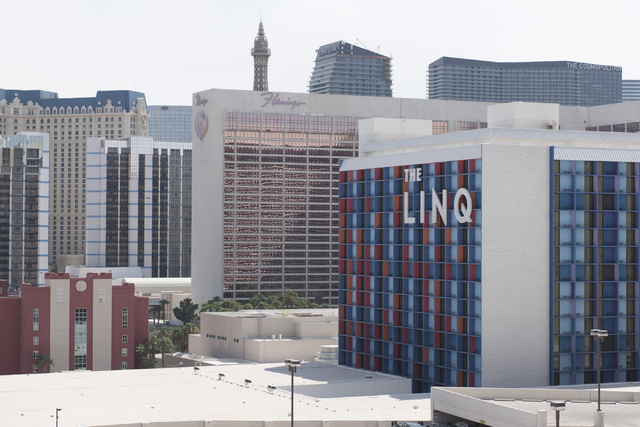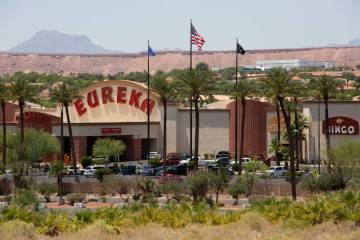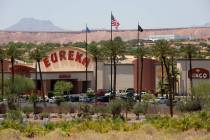Caesars Entertainment creditors reportedly tussling over control of gambling empire
Getting Apollo Global Management and TPG Capital to give up control of Caesars Entertainment was hard enough. Now comes the challenge of deciding who replaces them.
Creditors will own about 70 percent of Las Vegas-based Caesars after the company and its bankrupt operating unit finish reorganizing sometime next year. Those creditors are still negotiating the details of who will govern the sprawling empire, which owns one of the most iconic brands in gambling and operates 47 casinos in six countries, four people familiar with the talks said.
Caesars and the creditors are racing to work out the wording of the final legal documents needed to implement the deal by Friday, but that tentative deadline could be pushed back, the company said in a statement.
Who lands on the board of directors will determine whether the company decides to sell assets after it comes out of bankruptcy or sticks with its current portfolio and strategy. Priorities might include cutting dependence on the saturated U.S. gambling market and building higher-growth businesses, such as conventions and entertainment.
Picking board members may be complicated by the need for regulatory approval in some cases and by the sometimes-competing interests of creditor groups, said two of the people, who asked not to be identified discussing private deliberations.
Apollo and TPG, the two private equity firms that bought Caesars at the top of the market in 2008 for $30.7 billion, will see their ownership shrink to 16 percent from 60 percent, according to a Bloomberg Intelligence analysis. Other shareholders of Caesars and a publicly traded affiliate, Caesars Acquisition Co., will also own a piece of the reconstituted company.
Second-lien bondholders owed about $5.5 billion will own the biggest stake in the new company, at 34 percent, according to a term sheet released this week. That may translate into control of the board, depending on how the math behind the complicated deal works out, said one person. Control and the future strategy of the company also will be affected by different types of debt and equity holdings owned by creditors.
Elliott Management Corp., for example, held about $1.3 billion of the operating company’s first-lien notes and $685.8 million in first-lien loans, giving the investor the right to equity in both the new Caesars, which will operate the casinos, and a separate real estate investment trust being set up to own some of the most valuable land and buildings.
Creditors have pushed for a new board, one no longer controlled by the private equity firms, according to two people familiar with the negotiations. Apollo and TPG are resigned to that outcome, three of the people said.
The Caesars REIT, which includes properties such as the Caesars Palace, will still have $6 billion in debt, a level that may prompt investors to press for a sale of some assets, according William Clifford, chief financial officer of Gaming &Leisure Properties Inc., a REIT spun off from Penn National Gaming Corp. three years ago.
“There will be an opportunity for us” to acquire some properties, he said in an interview Tuesday.
Some new shareholders may just want to sell, according to James Stewart, CEO of MGM Growth Properties, a casino REIT created earlier this year by MGM Resorts International. Unlike the investors who bought into his initial public offering in April, the Caesars debt investors are “not a natural shareholder base,” he said on a panel Tuesday at the Global Gaming Expo, an industry trade show in Las Vegas.
Caesars’ main operating unit, Caesars Entertainment Operating Co., filed for bankruptcy in January 2015. Since then, second-lien bondholders led by billionaire David Tepper’s Appaloosa Management LP have battled the company and its controlling shareholders, Apollo and TPG, over how best to reorganize the insolvent operating unit and settle lawsuits related to the bankruptcy. On Tuesday, the parties announced they had settled their differences.
Although an agreement has been reached, an end of the Caesars bankruptcy isn’t imminent. There will be a formal creditor vote in November. Approval by a Bankruptcy Court judge could come in January or early February. The plan also will still have to pass muster with state casino regulators, and the Internal Revenue Service will have to approve the company’s REIT structure.
“Not everything is certain,” said Timothy Wilmott, CEO of Penn National, which competes with Caesars in some markets.
Gambling revenue at commercial casinos in the U.S. rose 2.3 percent to $38.5 billion last year and was just above the pre-recession peak of $37.5 billion, according to the American Gaming Association. Consumers have been slow to return to the gaming tables and new properties in states such as Pennsylvania have often cannibalized neighbors.
Las Vegas has managed to attract guests with its growing emphasis on nongambling attractions such as nightclubs and fine dining. Over the past six months, gambling on the Strip is down 1.4 percent from a year earlier, according to UNLV’s Center for Gaming Research. Visitor volume rose 1 percent to 3.64 million people in August, according to the Las Vegas Convention and Visitors Authority.
Caesars, despite its heavy debt load, managed to open new casinos with partners in Maryland and Ohio. Its financial stability was an issue in some new jurisdictions such as New York. Post-bankruptcy, the company could have more financial flexibility in pursuing projects, particularly in international markets where it has expressed interest, such as Toronto and South Korea.
Mark Frissora, the Hertz rental car CEO who took over as Caesars CEO in July 2015, is employing a strategy that focuses on cost savings, new restaurant concepts and technology, as well as remodeling hotel rooms. Room rates in Las Vegas rose 8.2 percent in the second quarter in part because of such enhancements, the company said.
“Hotel product is an area we have been undercapitalized relative to our competitors,” Frissora said on an Aug. 2 conference call, “creating the opportunity for high returns and low-risk renovations.”




























